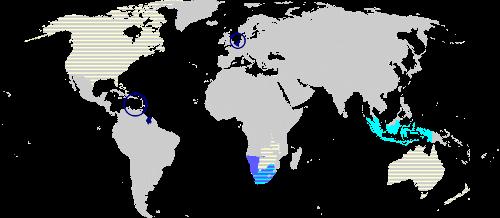NETHERLANDS
Language

Language
Cities in NETHERLANDS
| Amsterdam | Eindhoven | Maastricht |
| Rotterdam | The hague |
Language
 Dutch language area (including Afrikaans)Photo: 190 Christian CC 3.0 Unported no changes made
Dutch language area (including Afrikaans)Photo: 190 Christian CC 3.0 Unported no changes made
Dutch is an Indo-European, West Germanic language and as such has similarities with other West Germanic languages such as English and German. Yet there are also many differences.
Historically, the Dutch language can be divided into Old Dutch (until ca. from around the 16th century), initially also known as Lower German.
From the Old Dutch period is the West Flemish phrase "Hebban olla uogala nestas bigunnan hinase hic enda thu = have all birds started nests except me and you", discovered in 1932. The oldest known Middle Dutch text was written in a Limburg dialect by Henric van Veldeke (c. 1170). Towards the end of the 16th century, a common language from the Dutch dialect grew, with strong southern influences, especially in the written language.
There was an increasing interest in a national language of its own that could rival the Latin or Greek of the classics. The first Dutch speech art, for which Latin was the model, appeared in 1584 under the title Twe-spraack van de Neder-German Letterkunst and is attributed to H.L. Mirror. Especially the Statenvertaling (1637) of the Bible has promoted the unity of language use.
Since the 17th century, a great distance began to develop between written Dutch and the spoken language. The (relative) unity in spoken Dutch only came about much later, perhaps even well into the 19th century. Since the end of the 19th century, efforts have increasingly been made to bring the written language closer to the spoken language.
The latest spelling of the Dutch language is officially regulated in the Glossary of the Dutch Language (1995), nicknamed the "Green Book". The grammar of Dutch is exhaustively described in the General Dutch Speech Art (1997), often abbreviated to ANS.
The Institute for Dutch Lexicology (INL) in Leiden is a Belgian-Dutch institution whose tasks include the further compilation of the Dictionary der Nederlandsche Taal (WNT), which has since been completed in 1998, and the creation of an automated word archive.
The Meertens Institute (formerly P.J. Meertens Institute for Dialectology, Folklore and Nomology), which comes under the Royal Netherlands Academy of Arts and Sciences, is located in Amsterdam. Since 1980, the Dutch Language Union has been a partnership between the Netherlands and Belgium regarding the Dutch language and literature.
The official national language is Dutch and the Dutch standard language is called General Civilized Dutch (ABN). About 22 million people live in the Dutch language area: more than 16 million Dutch and about six million Flemish in Belgium. As a result, Dutch is a medium-sized language and is approximately thirtieth in the world ranking.
There are also many dialects of which only the Frisian language has a special status. Frisian is an official minority language of approximately 400,000 Frisians and has similarities with English and the Scandinavian languages. It is certainly not a dialect of Dutch, but an independent West German language. About half of the Frisian population still speaks Frisian.
Based on a number of differences, the Dutch dialects are divided into five main groups:
- The southwestern West Flemish and Zeeland dialects.
- The south-central East Flemish and Brabant dialects.
- The north-central Dutch dialects.
- The southeastern Limburg dialects.
- The northeastern Saxon dialects.
Even in northwestern France, several tens of thousands of people speak a Dutch dialect. In the Netherlands Antilles and Aruba and the former colony of Suriname, Dutch is the language of government and education. Furthermore, seventeenth-century Dutch served as the basis for Afrikaans, which is spoken in South Africa. Dutch is taught at approximately 250 universities around the world.
Many immigrant languages are spoken by the many immigrants living in the Netherlands, including Turkish, Arabic, Sranantongo (Surinamese) and Papiamento (Antilleans).
Sources
Haafkens, M. / Nederland
Gottmer
Harmans, G.L.M. / Nederland
Van Reemst
Metze, M. / De staat van Nederland
SUN
Ver Berkmoes, R. / Netherlands
Lonely Planet
CIA - World Factbook
BBC - Country Profiles
Last updated January 2026Copyright: Team The World of Info